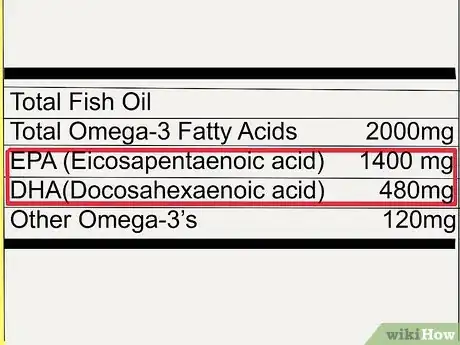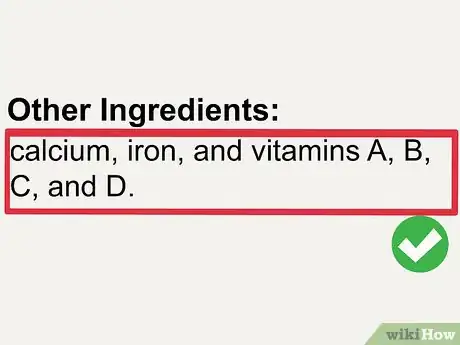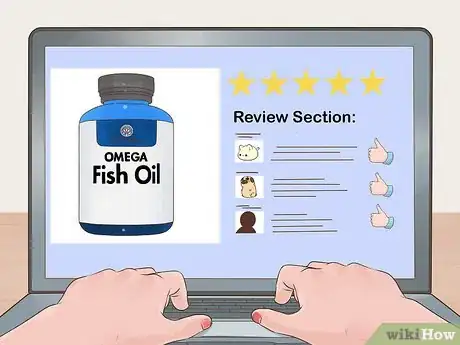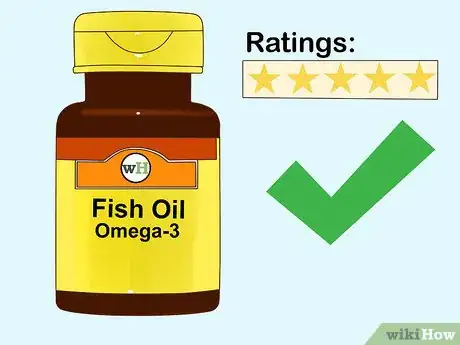This article was co-authored by Julie Brow-Polanco. Julie Brow-Polanco is a Master Herbalist & Certified Aromatherapist with more than 11 years of experience. She is an expert on natural remedies and specializes in using them to support whole-body wellness, particularly immune, digestive, nervous, and reproductive health. Julie earned a Bachelor's Degree in Psychology from Dominican University, a Master Herbalist Certification from The School of Natural Healing, and a Certificate of Aromatherapy from the Pacific Institute of Aromatherapy. Julie is a member of the American Herbalist Guild and a Certified Aromatherapist through the National Association of Holistic Aromatherapy.
There are 13 references cited in this article, which can be found at the bottom of the page.
This article has been viewed 6,258 times.
Fish oil is packed with an essential fatty acid called omega-3, something that can aid in cellular, heart, metabolic, and mental health.[1] People typically don’t get the necessary amount through diet alone, so fish oil supplements are a great option. Not all fish oil is equal, though, so it’s important to learn as much as you can before buying anything.
Steps
Reading the Label
-
1Find bottles with high levels of EPA and DHA. There are two main forms of omega-3 fats in fish oil, called EPA and DHA. Generally, DHA is beneficial for children and adults over age 65, while EPA is recommended for healthy adults.[2] Most supplements will provide both.
- A bottle of fish oil supplements may say that each capsule contains 1000mg of fish oil, but only 320mg of EPA and DHA. Look for supplements that have at least 600mg of combined EPA and DHA in a 1000mg capsule.
- The more DHA and EPA in your supplement, the more benefits you’ll experience.
- The concentration of DHA and EPA per serving is usually higher in quality supplements.
-
2Check the ingredient list for added nutrients. Find supplements that have added calcium, iron, and vitamins A, B, C, and D to make sure you get the most from your fish oil.
- Most fish oil supplements contain gelatin in the softgel casings.
- Using fish oil consistently lowers the plasma concentration of vitamin E to below normal levels. This is because fish oil oxidizes easily and consequently adds to the oxidant stress in a person’s body. Try to purchase a product with added vitamin E to counteract this effect.
- You should also find the source of a particular supplement’s fish oil.[3] The label will specify whether it’s derived from tuna, mackerel, or some other cold-water fish. Ideally, find an oil made from smaller fish like herring or mackerel. Small fish are lower on the food chain, so they don’t have as many toxins.[4]
Advertisement -
3Look for IFOS certified products. The International Fish Oil Standards Program (IFOS) is a third-party testing and certification company for fish oil supplements. Passing this test verifies that there are no harmful contaminants and makes sure the product is pure and fresh.
- Usually a bottle will have the IFOS certification on the label.
- To check if an item has been vetted by IFOS, visit the program’s Consumer Reports page and search through the listed fish oil brands.[5] There you’ll find consumer reports for all products that have been certified.
- Supplements without a certification from IFOS are not guaranteed to be free of contaminants, mercury, or dioxins.
-
4Select a well-known brand. Popular brands are popular for a reason; their products are high quality and their prices are affordable. Be wary of brands that don’t have a decent website.
- HealthWise Omega offers high levels of EPA and DHA.
- Wiley’s Finest Wild Alaskan Fish Oil provides smaller capsules, added vitamin E, and decent prices.
- Viva Natural adds vitamin E to their fish oil, and has one of the highest concentrations of EPA and DHA.[6]
Choosing a Supplement
-
1Get softgels if you want faster absorption. Softgels are convenient, portable, and the most common form of fish oil. The gel casing enhances the rate at which compounds are absorbed.
- The casings also help lessen the fishy taste.
- Look for emulsified capsules. Emulsified softgels improve digestion, absorption, and taste. The emulsification process breaks the oil down into small drops, increasing surface area for digestion. If you want your fish oil capsules emulsified, make sure it says so on the bottle.[7]
-
2Buy liquid fish oil if you want a stronger dosage. Liquid fish oils are more concentrated than capsules, which means you’ll get more DHA and EPA. These can be cheaper, but you should be okay with eating a spoonful of potent fishy liquid.
-
3Take ALA supplements if you’re vegetarian. Alpha-linolenic acid (ALA) is made from flaxseed, walnuts, soybeans and other sources that are acceptable for vegetarians.[8] This type of supplement is not exactly fish oil, obviously, but provides similar benefits.
Buying the Bottle
-
1Read product reviews. Look at what people are saying about the supplements and use the review section as a guide. It’s always a good idea to choose a product with a high rating and positive comments.
-
2Buy from a physical store when possible. Purchasing supplements from an actual shop ensures freshness and authenticity. If you must purchase from an online retailer, make sure it’s a respected supplier.
-
3Find a cost-effective product. Considering how many capsules you’ll need each day, taking fish oil supplements can be expensive. Find a balance between good reviews and cost. Pay attention to EPA and DHA levels, as some bottles that seem expensive may be more cost-effective.
- Some companies offer sample packs for little to no cost. You may only have to pay for shipping and handling. While you shouldn’t expect drastic results in a week or so, samples are a good way to see how your body reacts.
-
4Follow dosage instructions. The Food and Drug Administration recommends not exceeding 2 grams (0.071 oz) per day of combined EPA and DHA from fish oil supplements.[9] Note the serving suggestion on the back of the bottle, which is typically 1 to 3 1000mg capsules per day. Or, for liquid fish oil, usually 1 teaspoon.
Expert Q&A
-
QuestionHow do you know if fish oil is good?
 Julie Brow-PolancoJulie Brow-Polanco is a Master Herbalist & Certified Aromatherapist with more than 11 years of experience. She is an expert on natural remedies and specializes in using them to support whole-body wellness, particularly immune, digestive, nervous, and reproductive health. Julie earned a Bachelor's Degree in Psychology from Dominican University, a Master Herbalist Certification from The School of Natural Healing, and a Certificate of Aromatherapy from the Pacific Institute of Aromatherapy. Julie is a member of the American Herbalist Guild and a Certified Aromatherapist through the National Association of Holistic Aromatherapy.
Julie Brow-PolancoJulie Brow-Polanco is a Master Herbalist & Certified Aromatherapist with more than 11 years of experience. She is an expert on natural remedies and specializes in using them to support whole-body wellness, particularly immune, digestive, nervous, and reproductive health. Julie earned a Bachelor's Degree in Psychology from Dominican University, a Master Herbalist Certification from The School of Natural Healing, and a Certificate of Aromatherapy from the Pacific Institute of Aromatherapy. Julie is a member of the American Herbalist Guild and a Certified Aromatherapist through the National Association of Holistic Aromatherapy.
Master Herbalist & Certified Aromatherapist Make sure you know what the source of the fish oil is. This is important so that you know you're not not getting oil from a mercury-laden fish.
Make sure you know what the source of the fish oil is. This is important so that you know you're not not getting oil from a mercury-laden fish. -
QuestionIs fish liver oil good for you?
 Julie Brow-PolancoJulie Brow-Polanco is a Master Herbalist & Certified Aromatherapist with more than 11 years of experience. She is an expert on natural remedies and specializes in using them to support whole-body wellness, particularly immune, digestive, nervous, and reproductive health. Julie earned a Bachelor's Degree in Psychology from Dominican University, a Master Herbalist Certification from The School of Natural Healing, and a Certificate of Aromatherapy from the Pacific Institute of Aromatherapy. Julie is a member of the American Herbalist Guild and a Certified Aromatherapist through the National Association of Holistic Aromatherapy.
Julie Brow-PolancoJulie Brow-Polanco is a Master Herbalist & Certified Aromatherapist with more than 11 years of experience. She is an expert on natural remedies and specializes in using them to support whole-body wellness, particularly immune, digestive, nervous, and reproductive health. Julie earned a Bachelor's Degree in Psychology from Dominican University, a Master Herbalist Certification from The School of Natural Healing, and a Certificate of Aromatherapy from the Pacific Institute of Aromatherapy. Julie is a member of the American Herbalist Guild and a Certified Aromatherapist through the National Association of Holistic Aromatherapy.
Master Herbalist & Certified Aromatherapist Yes, definitely! The best option available is fish liver oil, not just fish oil, because it has vitamin D, vitamin A and all of the other Omega fatty acids.
Yes, definitely! The best option available is fish liver oil, not just fish oil, because it has vitamin D, vitamin A and all of the other Omega fatty acids.
Warnings
- Fish oil is very potent, even in capsule form, so there may be a fishy aftertaste.⧼thumbs_response⧽
- Side effects may include bad breath, nausea, indigestion, diarrhea, indigestion, and rash.[13]⧼thumbs_response⧽
- Fish oil studies are ongoing, and none of the benefits are guaranteed. Opinions on omega-3 supplements are mixed, so keep that in mind when doing research.[14]⧼thumbs_response⧽
- Ask your doctor if fish oil is compatible with any current medications.⧼thumbs_response⧽
References
- ↑ https://www.organicfacts.net/health-benefits/oils/health-benefits-of-fish-oil.html
- ↑ https://www.psychologytoday.com/us/blog/in-the-zone/201204/what-are-the-real-differences-between-epa-and-dha
- ↑ Julie Brow-Polanco. Master Herbalist & Certified Aromatherapist. Expert Interview. 12 April 2022.
- ↑ https://www.precisionnutrition.com/all-about-fish-oil
- ↑ http://www.nutrasource.ca/ifos/product-reports/default.aspx
- ↑ https://vivanaturals.com/supplements/fish-oil
- ↑ https://www.ncbi.nlm.nih.gov/pubmed/19465191
- ↑ https://www.webmd.com/healthy-aging/omega-3-fatty-acids-fact-sheet#1
- ↑ https://www.webmd.com/vitamins/ai/ingredientmono-993/fish-oil
- ↑ https://www.mensjournal.com/food-drink/10-reasons-every-lifter-runner-and-athlete-needs-omega-3s-0/
- ↑ https://www.huffingtonpost.com/craig-cooper/fish-oil-benefits-_b_832661.html
- ↑ https://www.webmd.com/diet/omega-3s-in-fish-oil-and-supplements-whats-your-best-strategy#1
- ↑ https://www.webmd.com/vitamins/ai/ingredientmono-993/fish-oil
- ↑ https://www.webmd.com/vitamins/ai/ingredientmono-993/fish-oil

































































Medical Disclaimer
The content of this article is not intended to be a substitute for professional medical advice, examination, diagnosis, or treatment. You should always contact your doctor or other qualified healthcare professional before starting, changing, or stopping any kind of health treatment.
Read More...